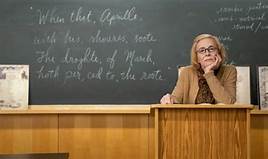I just binge-watched Netflix’s six-part mini-series entitled “The Chair,” and brother did it bring back memories of when I was a University of Illinois department head and later, the dean of a college.
Unlike my 13-years in academia, The Chair takes place at fictional ultra-liberal Pembroke University, which one faculty member snidely refers to as a “second-tier sub-Ivy.”
The series stars Sandra Oh as Ji-Yoon Kim, the school’s “first woman of color” to ascend to the chair of Pembroke’s staid and stodgy English department.

You would think that running a traditional English department in the normally sedate realm of the humanities would be easy for Professor Kim, whose twenty-some years in academia has been spent as an Emily Dickinson scholar.
But alas, that is not the case.
Instead, her English Department, which is populated by several aging, traditionalist professors—some with more than 30 years in academia—is a maelstrom of faculty and student discontent.

First, the dean tells Chairwoman Kim that budget decreases are coming and she needs to make some cuts in her department, preferably convincing a few of the ancient faculty members to retire. (In academia, there is no established retirement age. Professors can conceivably rule the classroom until they drop).
Then, one of her senior professors is on the warpath because she has been moved to a dingy basement office in another building in order to accommodate the department’s newest hire. (God help any department chair or head who has to deal with THAT issue. And I speak from experience! Next to tenure, having prime office space is the most critical item on any professor’s agenda).
Chairwoman Kim discovers that the newest hire, a hip African-American woman named Yaz McKay, is a self-absorbed narcissist who will demand “special handling.”

Why? Because she has been assigned to team-teach an American literature survey course with stubborn old-school octogenarian Professor Elliot Rentz, whose classes students shun because they are uninspiring and mind-numbing.
Professor McKay is not happy about her teaching assignment, but she is an assistant or associate professor (it wasn’t clear which) on the tenure track and Rentz is the chair of her tenure committee—which gives him extraordinary leverage over her.
Rentz is a dull, inflexible traditionalist and that’s how he approaches his poorly attended classes. Professor McKay is his “woke” polar opposite, and it doesn’t take her long to demonstrate that fact.
To Rentz’s horror, Professor McKay decides to teach Herman Melville’s classic 19th Century book “Moby Dick” using a bevy of student rappers. In a jaw-dropping classroom performance, the rapping students turn Melville’s classic prose into an effervescent hip-hop chant. Professor Rentz is outraged by such literary impertinence.
While Professor McKay’s idea is hip and trendy, in the end, it simply panders to the students’ “wokeness” and fails to engage them intellectually. Eventually, Professor McKay feels undermined by Professor Rentz and threatens to leave Pembroke for Yale, where she has been offered both tenure and an endowed chair.
To top things off, Bill Dobson, one of Pembroke’s most popular literature professors, who is also a nationally recognized author, is caught on camera joking around in class wearing a Nazi SS uniform and giving the “Heil Hitler” salute.
Pembroke’s ultra-woke liberal students are not amused. In fact, they are outraged and demand that Professor Dobson be fired from his tenured position. Never mind that the besieged Professor Dobson was simply attempting to demonstrate the farcical connection between fascism and the absurd.
The Dean of the college caves and Dobson is dragged before a disciplinary committee where he is suspended.
And all of this is only a few weeks into Professor Kim’s tenure as department chair.
I found myself thinking: “God help her. She has just entered the malevolent academic dominion known as “administration hell.”
At this point, it might be well to mention the oft-repeated axiom that says: “Academic politics are so vicious precisely because the stakes are so small.”
Some attribute that axiom to former Secretary of State Henry Kissinger, but others say it was first uttered by Wallace S. Sayre, a late Professor of Political Science at Columbia University.
No matter. The fact is that in Academia the intensity of feeling in any dispute is inversely proportional to the value of the stakes at issue—and that is why academic politics are so bitter.
So is the Chair an accurate portrayal of academe? The Chair has its authentic moments.
For example, its portrayal of the English department’s eclectic group of faculty, their attitudes, and their unremitting grievances, is on point.
So too are the rigid and some might say unconstitutional rules that govern behavior in the academy. They are accurately depicted. For example, poor Professor Dobson is granted only minimal due process before he is tossed onto the academic scrap heap. In the academy, you are always guilty until proven innocent–all rights guaranteed by the Consitution notwithstanding.
But where The Chair really hits its stride (whether intentionally or not) is its portrayal of today’s woke and hypersensitive students.

Pembroke University students seem more intent on preserving their malicious and intolerant mob mentality than in engaging in any kind of evocative debate that might require them to open their minds to new or diverse ideas.
The horde of vociferous brats screaming for the head of Professor Dobson and who eventually cause Chairwoman Kim to lose her position as department chair, are self-absorbed holy terrors seemingly bent on Pembroke’s destruction rather than acquiring a comprehensive education.
In their minds, Pembroke is too orthodox, too straight, and too white. It also tolerates too much conservative thought that conflicts with the students’ deeply entrenched liberal dogma and to many students, that is “threatening.”
In that respect “The Chair” has gotten it right. Universities should not be spineless places replete with “safe spaces” or wokeness zones.
They should be places where learning is rigorous, where students are exposed to a broad array of attitudes, philosophies, and viewpoints—no matter how unpleasant and objectionable they may seem to today’s squeamish brood of fragile progeny.
There is an old African proverb that says: “Smooth seas do not make skillful sailors.”
Should there be a season two of “The Chair,” the doyens at Pembroke would do well to heed that aphorism and restore Professors Kim and Dobson to their previous positions.
I know I would if I were the dean.


